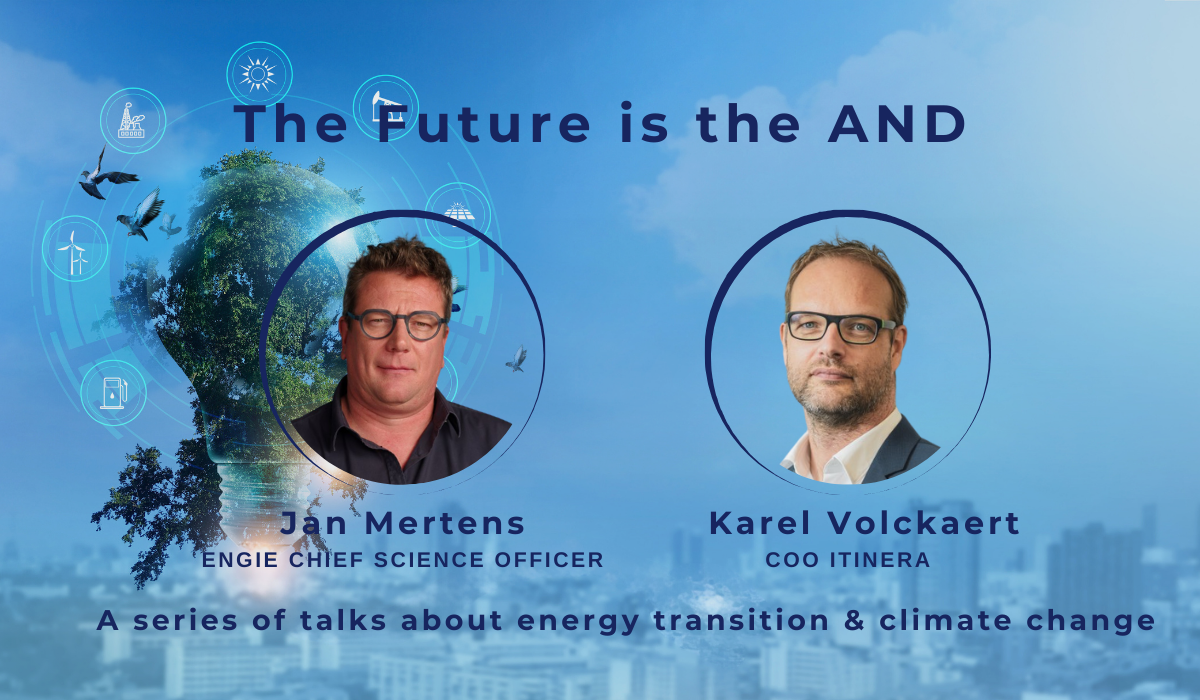

Hydrogen will be incredibly important, but in many cases rather as an intermediary to some other molecule for which we can use existing infrastructure.
Karel Volckaert
Does energy transition / de-fossilization involve a choice of technology for you?
Jan Mertens
I think we're going to need almost all of them. I always say, the future is the AND.
I really hate energy black or white discussions, in favour or against nuclear, in favour or against hydrogen, in favour or against PV. I think the question should be “In what context and situation is this or that the most useful technology?” We're going to need all of them..
Karel Volckaert
Suppose we were in a situation where things didn’t work out. What will it have been due to? Can you make that kind of pre-mortem analysis?
Jan Mertens
It certainly won't be because of technology. We won’t be able to use a lack of technologies as an excuse for not getting there. What is important, first of all, is the regulatory framework for new technologies. For example, around hydrogen, using hydrogen plus CO2 to make e-fuels. The regulatory context of that still isn’t terribly clear, when in fact we very urgently need it. And the second thing, which is linked to that, is also the business plans for many of those new technologies. Actually, the gap to between cost of the new technology and the cost of the fossil alternative is too big.
Renewable electricity versus fossil electricity, that gap has been closed. Now we have to try to close the gap for those new technologies, as soon as possible. Hydrogen, e-fuels, batteries… we have to close the business plan and the regulatory affairs have to follow to get those projects flying, first demonstrate and then scale up as quickly as possible.
Let's talk about things like hydrogen and e-fuels. Where are things going wrong there now? specially when we talk about green hydrogen, making hydrogen from renewable electricity. It is true that we do currently have more and more green electricity in Belgium. But the price is still significant. And the price of hydrogen is dominated by two factors: the price of your electricity, and the price of your electrolyzer itself, the capex. The capex of the electrolyzer is due to scaling. When we look at what happened with PV and wind, I'm fairly optimistic about that.
The question within Western Europe is still, “are we going to get the price of green renewable electricity down so we can then turn it into hydrogen?”
Because not only will we have to make hydrogen, we're going to be electrifying more and more, as well. Where and what we can electrify, we should! So we're going to be in competition with so many industries, and not just for our cars, because those industries are also going to electrify more and more. So the question really is, are we going to have enough affordable green electricity left to make that green hydrogen in Europe, and by doing so throwing away 40% of this scarce electricity, when we will need that hydrogen or at least those green molecules in many of those industries.
Karel Volckaert
But if we have to get them from somewhere else in the world, we’re going to have to start talking about compression, about transportation. And I don’t think those are cheap steps in the value chain.
Jan Mertens
As I often say, we should not decarbonize, but defossilize. Let’s look back at the economic analysis of hydrogen production in the Middle East. You have access to cheap PV electricity there, which you convert to hydrogen there. Then you still have to get it here. Liquifying hydrogen is one possibility, but the problem with hydrogen liquification is that, with the technology we have, it's actually incredibly expensive and we lose up to 35-40% of our energy content in liquification. And neither de we have the boats to bring it here. Liquid hydrogen will be important, of course, if the distance transport is not too far. But from the Middle East to here, I don't think liquid hydrogen will be the first option. What could be a good option is to convert the hydrogen in the Middle East to methanol, to methane, to formic acid, to ammonia, or gases like methane that we already import today in their fossil version. Actually, we will be losing most energy in the hydrogen production since that is only around 60 % efficient. We will again lose 10 to 15% of energy in converting that hydrogen in these other molecules but that’s often in the form of heat that we can then still valorize, for example, to run a direct air capture unit to get CO2 from the air. So I think hydrogen will be incredibly important, but in many cases rather as an intermediary to some other molecule for which we can use existing infrastructure. While for hydrogen, we need to roll out completely new infrastructures.